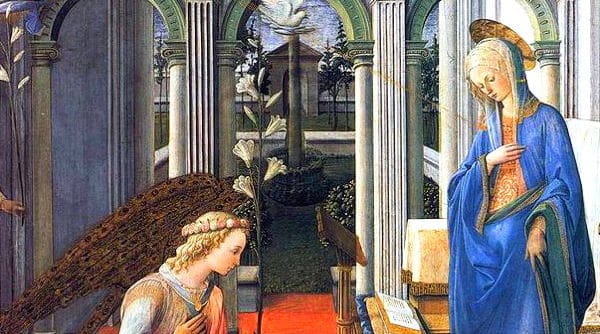Do you feel weighed down by the sneaking suspicion that you’re not doing enough?
I know firsthand the crushing weight of the thought, “I’m not doing enough to be loved.” There was a time in my life when I wasn’t even conscious of thinking it—I was just driven to do more and more, and I didn’t know why. I reached the end of every week exhausted, but the exhaustion still caught me by surprise every time. I thought there must be something wrong with me but couldn’t figure out what it was.
If the Annunciation were celebrated on Saturday like it is this year, the pre-2020 John would definitely not have gone. First of all, no one has to go. But second, the thought of going made me, in particular, feel two feet tall. I compared myself to Mary, who had already done so much more through her one yes than I could do in a lifetime. I thought of Annunciation Mass as a reminder of my inferiority, of all the times I had said no to what God wanted me to do. I felt that the one weapon I had to take heaven by storm was doing my duty, yet the Annunciation recalled the many times I had not been dutiful at all. Feeling naked, ashamed and having nothing, I stayed home.
As I slept in anxiously past my alarm, I didn’t have a deep, abiding sense that the Lord was with me and loved me already. I had no idea that the Lord thought of my soul as his bride and wanted to meet me in the bridal chamber where, in the breathtaking words of St. John Paul II, “shame is swallowed up by love.” I had heard similar words before, but they didn’t take root in the soil of my heart. I wasn’t ready to receive them.
Then in 2020, because I would not put aside my all-consuming busyness, God used the pandemic to put it aside for me. In the silence that followed, I started reading Isaiah, Jeremiah, Hosea. I read God’s love letters to his people and his entreaties for them to come back. I began to long to be healed and restored. Being a man, I still wasn’t sold on being the Lord’s bride.
But even as a man, I know now that I need a vision of what being healed and restored looks like. I need a vision of what God is calling me to come back to. This vision is Mary’s vision. Conceived without sin, she experiences an unbroken continuity of moments with God. She rests in her continuing knowledge that she is chosen and loved.
Brant Pitre argues that at the time of the Annunciation, Mary had already taken a vow of perpetual virginity. She saw that the Lord cherished spending his life with her and—beautifully—she wanted to be with the Lord in return. She vowed not to have relations with a man in order to dedicate herself solely to relations with God.
So, Mary’s obedience at the moment of the Annunciation was the climax of a growing delight. Around the time of Mary’s vow of virginity, something new had started to appear in her. God’s desire for her had awakened a desire in her own heart, fierce and even terrifying in its intensity. When she heard the greeting, “Hail, favored one!” and God began his encounter with her, she remembered her desire and began to tremble, afraid.
Mary’s heart began to quiet down as the full import of the angel’s words sank in. “The Lord is with you”—he desires me, too. With him, I am safe and beloved.
Then came the delight. Mary asked, “How can this be, for I do not know man?” Yet she already knew that she was betrothed to the Most High, and she was about to be told that the fruit of this encounter would be his Son. I think that at this moment, she was overcome with the weight of God’s gift, much as a bride would be when her wedding day finally came. You have visited me with the love you had for me this whole time—my cup overflows—thank you, thank you!
If you have said no to God in your own life and are tempted to think you’ll never be holy like Mary, that shame and discouragement are not from God. Since then, I’ve realized what the Church has always proclaimed: it was only because of the Cross that Mary could stay united to God, fruitful and untouched by sin.
The best part? Mary is the new Eve. In her, you and I are given another chance to say yes to God, with all our sins put to death on his Son’s Cross. We are not who our shame says we are. Our past does not define us. As we say yes now, Christ comes to dwell in us, too.
Image of the Annunciation: Filippo Lippi, Public domain, via Wikimedia Commons




